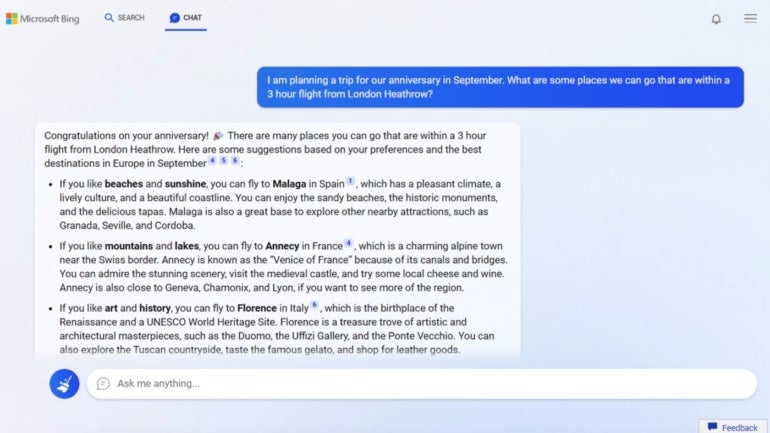Microsoft goes for Google with ChatGPT-enabled Bing search
Microsoft’s ChatGPT integration into Bing offers refined search, chat, content generation suggestions, and more.
On Tuesday, Feb. 7, Microsoft announced that it will enable natural language functionality from OpenAI, the company behind ChatGPT, on Bing. Adding artificial intelligence to search is an interesting provocation for its much more common rival: Google’s household-name search engine.
Jump to:
What is OpenAI?
Technically, the new capabilities of Bing’s search engine are not the same ChatGPT (Generative Pre-trained Transformer) AI chatbot that has been making a lot of headlines. Instead, Bing’s AI-powered search runs on an OpenAI large language model that builds on Microsoft’s experience with Bing searches as well as ChatGPT and GPT-3.5. Microsoft is calling its unique mix the Prometheus model.
SEE: Microsoft makes multi-billion dollar investment in ChatGPT-owner OpenAI (TechRepublic)
It’s all built in partnership with OpenAI, a nonprofit artificial intelligence research laboratory founded in 2016 by tech giants, including Elon Musk and Peter Thiel. ChatGPT was released semi-publically in November 2022 and has generated a lot of chatter for both uncannily human-sounding responses as well as some that are just uncanny. It has been licensed exclusively to Microsoft for commercial use since September 2020.
ChatGPT has also been the subject of some cybersecurity concerns this year.
What does OpenAI mean for Bing search?
The updated Bing search engine, now available in preview, will “deliver better search, more complete answers, a new chat experience and the ability to generate content,” Microsoft said. The preview answers select questions, with limited answers.
The plan is to be able to answer more complex questions or solve tasks. You’ll be able to write an email, create a travel itinerary or create quizzes through the same search engine interface.
It addresses some existing concerns with the Bing search engine as well, aiming to provide more relevant searches. Like Google, Microsoft understands that many people use a search engine as a homepage, so it has moved information like sports scores, stock prices, recipes and weather to the top of those searches. A side bar will show more comprehensive answers.
AI capabilities come into play with an interactive chat that can provide questions to guide you toward a more specific search. It might, for example, help with planning a trip or deciding which product to buy.
“AI will fundamentally change every software category, starting with the largest category of all: search,” said Satya Nadella, chairman and CEO at Microsoft. “Today, we’re launching Bing and Edge powered by AI copilot and chat to help people get more from search and the web.”
Microsoft Edge browser update
The Edge browser will now have new AI capabilities, a new look and two new functionalities: chat and compose. Chat uses natural language AI to help you compose an email or a LinkedIn post. Then, it can provide guidance on the tone, format and length of the post, plus understanding what web page you’re writing for and adjusting those decisions accordingly (Figure A).
Figure A

Google strikes back
Google plans to use generative AI to add comparable features to its much more commonly used search engine. Google is going with a “no one right answer” approach, changing the way it organizes information into distinct sections for complex information and quick hits.
“Soon, you’ll see AI-powered features in Search that distill complex information and multiple perspectives into easy-to-digest formats, so you can quickly understand the big picture and learn more from the web — whether that’s seeking out additional perspectives, like blogs from people who play both piano and guitar or going deeper on a related topic, like steps to get started as a beginner,” Google and Alphabet CEO Sundar Pichai wrote in a press release on Monday, Feb. 6.
Google is using a proprietary natural language processing service called Language Model for Dialogue Applications. This will roll out to search “soon,” Google said.
For developers, there are plans in place in the near future to release access to Google’s Generative Language API.
While some analysts predict Google’s caution might let Microsoft get ahead in terms of new tech trends, Google still has an 84% market share among search engines among general users.
Read next: Artificial Intelligence Ethics Policy (TechRepublic Premium)
For all the latest Technology News Click Here
For the latest news and updates, follow us on Google News.
